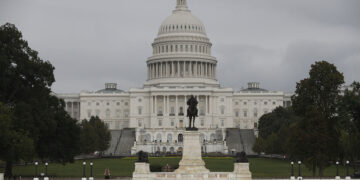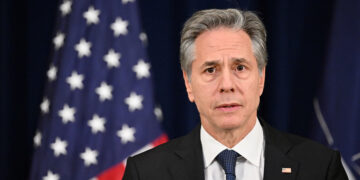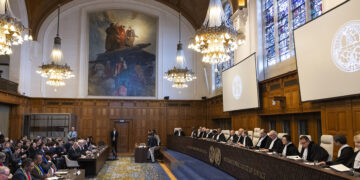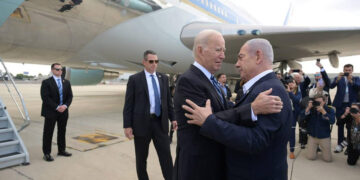Sarah Leah Whitson is the Executive Director of DAWN.
First published in Boston Globe, on April 23, 2021
The contrast of the images are striking to me still. One bulletin board in my sixth-grade Armenian school classroom in Los Angeles was festooned with colorful construction-paper Easter bunnies and eggs, and glitter-and-foil-covered cardboard crosses and well wishes to celebrate the resurrection of Christ. The other bulletin board had only grainy black-and-white photocopied pictures of emaciated orphans, pyramids of skulls guarded by Turkish gendarmes, long winding caravans of women and children marching in rags with their tiny bundles through the desert.
April, the month of Easter, was also when we commemorated the Armenian Genocide, the mass extermination of 1.5 million people in the region — 75 percent of our population — at the hands of the Turkish government. I would stare deeply into the photographs to see if one of those children could have been my grandfather, orphaned in Diyarbakir when he was 5, before missionaries whisked him off to Lebanon.
We're now at the 106th anniversary of this crime, for which the word "genocide" was first invented, and it's been nearly as long that Armenian survivors and their descendants, strewn around the world in dozens of diaspora communities, have fought to have it formally recognized as a genocide in world capitals. There you will have found us, as soon our grandparents could take a first breath of newfound security — from France to Brazil, from Australia to the Vatican, from Egypt to Canada — pleading our case to legislatures to stand with humanity and condemn this brutal crime, and cheering when they did. There you find us still, pleading with President Biden to make good on the promise he made, and that so many prior presidents have broken, to formally say the words, "the Armenian genocide."
Why, you might ask, have global Armenian communities invested so much time and effort, and so many resources, to persuade others to recognize the wrong done to our people? What difference does it make to our forebears, whose scattered bones have long settled in the banks of the Euphrates, or calcified in the mass graves of Syria's Deir Zor desert, where the deportation caravans terminated? We still raise our children with the memory not just of the wrong done to our people, but also the wrong that continues with each year that the Turkish government denies it ever happened. Scholars learn more each year about the science behind generational trauma; we and our children continue to live it, with a deep, ingrained sense of injustice and an almost unexplainable, collective drive to resist the erasure the genocide intended. The need for recognition by the international community is a quest for at least a fraction of accountability: affirming the truth of what happened. One hundred six years later, that quest has only gotten stronger, no doubt fueled by Turkey's own stubborn refusal to come to terms with its past.
I'd like to think the Armenian people's dedication to accountability, against the political odds that favor acquiescing to the power, wealth, and influence of the Turkish government, is an important contribution to the noble mission of global justice and what comes with it: the preservation of our humanity. After the Shoah, the world joined together to bring some of the key perpetrators to justice, to honor the dead, to compensate the living victims, and to vow "never again." It was a critical moment for the world in establishing that we still share some modicum of a universal language of rights and wrongs, of truth and justice.
There has been no similar reckoning in the case of the Armenian genodice, a reckoning that would help strengthen the rule of law worldwide and provide some consolation and perhaps closure to the Armenian people. Coming to terms with the past is no less a favor for the people of Turkey, stuck as they are with a government whose denials give them no quarter to learn about or resolve all that transpired at the hands of their own forebears, and entangles them in perplexing global scorn.
This past year has been a particularly devastating and painful one for Armenian communities around the world, faced with the loss of territory to Azerbaijan from the republic of Karabakh in a war that took the lives of over 5,000 Azeri and Armenian young soldiers amid the coronavirus pandemic. A military defeat would have been sufficiently wounding, but what was most terrifying was the decisive participation of Turkey in the war, replete not only with advanced, lethal drones and Syrian mercenaries, but also propaganda in Turkish media that they would "finish off" what they started in 1915. Many Armenians were truly convinced that Turkish forces would attempt to slaughter the population of Armenia as well, making a politically negotiated solution all the harder for the now beleaguered Armenian prime minister, Nigol Pashinyan.
Biden faces complicated conflicts and multiple competing priorities in the Middle East, for which the United States needs the cooperation of the Turkish government, or at least to prevent it from acting as a spoiler in the region. He must, however, remove the issue of the Armenian genocide from the negotiating table, because the recognition of our collective human history should never be used as a bargaining chip. With both houses of Congress having reaffirmed their recognition of the genocide last year, Biden has ample backing to make the American government's position clear for the record. He will bolster his legacy and credibility as a president who meant it when he said human rights would be a priority for his administration. He can help lead the international community to place a wreath on this stain of history, and have hope that a better future may come.
Photo Credits: A woman stands at the Tsitsernakaberd Memorial to the victims of mass killings by Ottoman Turks, in the Armenian capital Yerevan, Armenia, Oct. 30, 2019.HAKOB BERBERYAN/ASSOCIATED PRESS





































